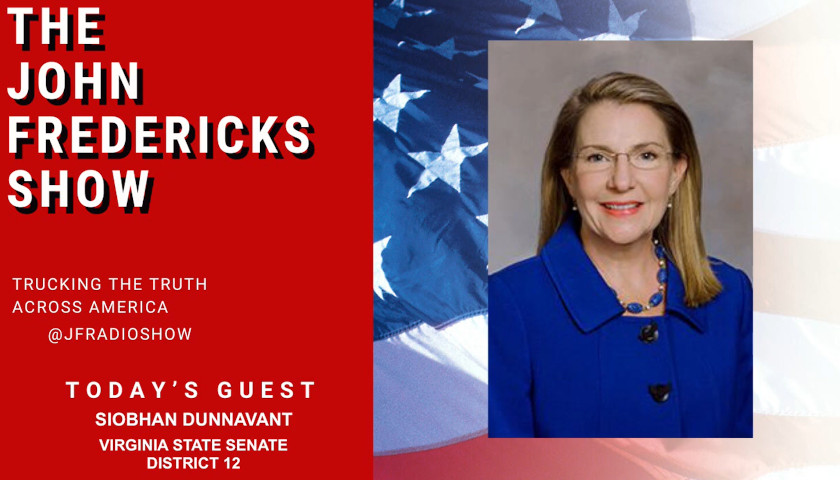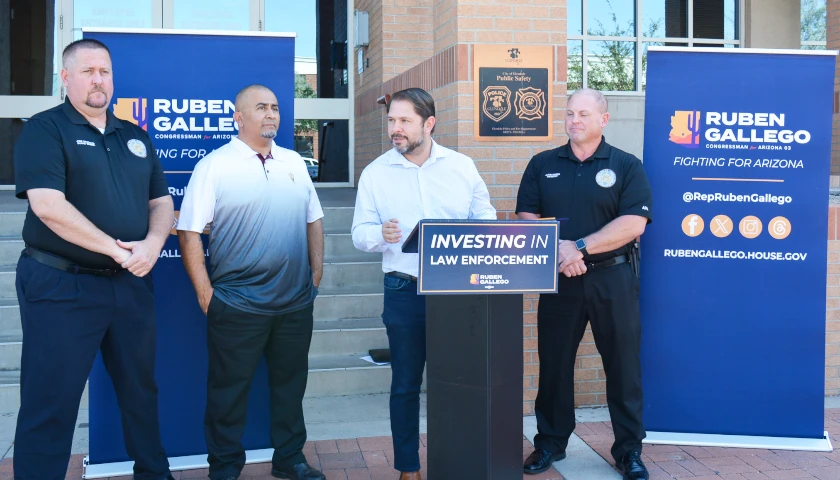Live from Virginia Wednesday morning on The John Fredericks Show – weekdays on WNTW AM 820/ FM 92.7 – Richmond, WJFN FM 100.5 – Central Virginia, WMPH AM 1010 / FM 100.1 / FM 96.9 (7-9 PM) Hampton Roads, WBRG AM 1050 / FM 105.1 – Lynchburg/Roanoke and Weekdays 6-10 am and 24/7 Stream – host Fredericks welcomed state Senator Siobhan Dunnavant to the program.
During the show, state Senator Dunnavant described the ongoing and ever-changing special session calendar and how it’s costing a lot of money. She later added that the citizen review board contained an undercurrent of suspicion and disregard for police and is an unfair board that would judge career police officers.
Fredericks: Joining us now state Senator Republican Dr. Siobhan Dunnavant. Senator Dunnavant, always great to have you on early because I know you’ve got patients to attend to at the bottom of the hour. So thanks for making time for us.
Dunnavant: Thank you so much for having me on John. I’m really always happy to be here.
Fredericks: Siobhan, lots to talk about today. Let’s talk about this special session that you are involved in. Does it just go on until January? Will it ever end?
Dunnavant: I have no idea. It’s extraordinarily frustrating because the schedule keeps changing. I am so honored to serve the 12th district in the legislature and be there. But it’s completely unpredictable. I have patients that had made appointments six months ago. And for instance last week, two weeks ago they told us we are going to be here Wednesday, Thursday, Friday of every week until we’re done.
OK. I went and adjusted my schedule and adapted to that. At the end of the week last week, they said first we are not coming next week. Then they said we aren’t coming next week but we’re going to come Tuesday and Wednesday instead. So I’m going to say this, they are not running a schedule as a working mother would.
We run a very tight calendar and we give everybody a lot of lead time. It’s very hard to have attendance when people are coming from all across the state when nobody knows when they have to be there. This is a citizen legislature. We are not full-time politicians. I don’t want to be. I really want to be a doctor that takes what I learn from my patients to the legislature to inform decisions. But they are not making that easy.
Fredericks: Are these decisions coming from the state Senate’s Democratic leadership? Or are they driven by the House and the Caucus of the Corn?
Dunnavant: It’s a little bit of the same. Right now we have completed our Senate work. And so we are waiting for both our finance committee to do the budget. And also to get all of the bills out of the House. And so we have to respond to what they do. And we can’t respond until they send it to us. But ultimately our leadership can decide how we respond.
And there should be a way to be able to clump this together and efficiently perform the services that are necessary for the state. But honestly, if you think about how much money this costs every day. When we go in there and we talk about three bills, this is a lot of money for the state for this disorder.
Fredericks: I’ve been covering this for a decade and normally you have a special session that’s tight. Its a couple of days. You have the veto session and maybe you have one called in the summer for a budget crisis or something of that nature. You fix it and you go home. But now there is no end in sight.
And it seems like the House led and by I make fun of it because it kind of fits and Eileen and the Caucus of the Corn and the hard left over there, it seems like they are just taking an opportunity to draw up bill after bill after bill and smash it through. None of them are getting any bi-partisan support at all. There is no teamwork going on. It’s just smashing these things through.
And then the state Senate has to deal with it. Like last night. Tell me about last night when all of the Republicans voted in opposition to the new bill in the Senate that passed setting up these citizen review boards. All of the Republicans voted no. And some of the speeches I saw like from Senator Bill DeSteph that come to mind were very passionate. A lot of Republicans upset over that. Why?
Dunnavant: I think the really frustrating part is that the public conversation about what we might agree on and what needs to be done is not what is being put into the bills. And instead, the bills have sort of an inherent undercurrent of suspicion and disregard for police.
And it’s very very frustrating to hear this glossy representation that we need to do something to improve accountability. But to see that these review boards actually take the review process out of the police department where the subject matter experts are and put it on a citizen review panel who may or may not have any subject matter expertise.
I can tell you this much, nobody on the police is allowed to be on that civilian review panel. They are going to review the actions of the police and then direct both the police officer and the division what the actions will be. And those are binding decisions these panels have subpoena ability.
It’s one thing to say that a public advisory committee would contribute to improved relations and mutual understanding between the police department and the public. And I think that is a fair statement. But these review panels that they are implementing or suggesting localities implement really are not appropriate.
I was on the board of medicine for years. We reviewed doctors that had decisions that were questioned by public complaints. And we were the intersection between the public’s concern and what professional review decided. You can’t really have, I don’t think there is anybody that has a job that when somebody who knows nothing about their job evaluating how they do it.
And police have a very specific set of competencies and training so they should be reviewed within. And then the Democrats honestly they dismiss the deep-seated concerns of what these panels are going to do to destroy the sense of confidence that police have in this career.
And they say, oh don’t worry about it. This is going to be OK. Literally, this is a quote from the floor last night. This is an OK thing to do. it’s an OK thing to do. That is staggering to me. The legislature should be extremely concerned about every action that they take in every possible unintended side effect.
And they just keep passing legislation that has terrible jeopardy wrapped unceremoniously in mistruths that are overly positive seemingly like they are responding to people’s concern. It’s hurting us. We’ve already had a lot of retirements in the police departments.
People who are leaving. And nobody is going to want to be a police officer. How are you as a police officer going to have confidence in your ability to make a decision what it took to make that decision when you know you have a civilian review board that’s going to determine your future? It’s just wrong.
Listen to the full show here:
https://youtu.be/iZ_GSi5wz7c





